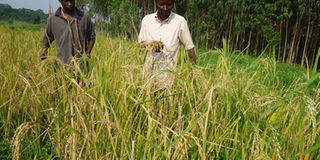Poor harvest methods leave Bugweri rice farmers in loss

A rice garden. Photo | File
What you need to know:
- The farmers say they lose 10 to 15 bags each harvest. Mr Kamo Kamani, the chairperson of Idudi Farmers’ Cooperative, yesterday said the country was losing its market to Tanzania because of poor yields
Many rice farmers in Bugweri District are counting losses due to poor post-harvest management, rampant floods, and unpredictable water supply.
The farmers say they lose 10 to 15 bags each harvest. Mr Kamo Kamani, the chairperson of Idudi Farmers’ Cooperative, yesterday said the country was losing its market to Tanzania because of poor yields.
“Tanzanian rice is very clean, it’s hard to find a stone and a kilogramme costs between Shs4,000 and Shs4,700 unlike ours where we sell at Shs3,400. As a result, farmers earn little from their work. If our farmers can handle the rice well during the production, they will earn from it,” Mr Kamani said.
He added that farmers will continue to earn little due to poor post-harvesting handling. Farmers have also asked the government to rethink a policy encouraging more rice imports, saying it is pushing them from the market.
Tanzanian rice enters Uganda duty-free under the Common External Tariff- CET arrangement of the East African Community. Despite the CET, Tanzanian rice is still more expensive than Pakistani rice, which benefits from government subsidies.
Mr Joel Kakaire, the country director of African Fertilizers and Agro business, said they have supplied 30,000 metric tunnels of fertilizers and trained more than 10,000 farmers specifically on post handling to address losses.
“Someone might plant the right seed but when it comes to harvesting, they don’t do it at the right time and when it comes to drying, the farmers do it on bare ground. Their stores also have rats, which means they make losses every other day,” Mr Kakaire said.
“We have trained farmers in post-harvest handling because many may be planting the right seeds, but lose a lot at post-harvest. The estimate is 30 to 40 percent,” he added.
Mr Kakaire urged farmers to invest in good storage systems. “If you have a good store, storing in hematic bags and drying on taplins, you are able to minimise those losses,” he said.
Mr Karakire added that they had also trained farmers in fertilizer application, and product knowledge to ensure they buy the appropriate seed and chemicals. He said they had also reduced the prices of fertilizers.
Ms Harriet Nabirye, an administrator at Grain Council of Uganda, said markets in South Sudan and Sudan are rejecting Uganda’s products because they have a high level of aflatoxins.
“It’s important for the farmers to get this awareness because they are losing out, especially since the grain they are producing is not safe,” Ms Nabirye said.





